You could hear the drums before you even pulled into town.
For the second time in six years, I stepped off the bus in Donggang for the opening day of the triennial King Boat Festival. A makeshift night market strung with halogen lights and blinking LEDs had been slapped together around Donglong Gong (東隆宮), the town’s main temple, whose ornate golden front gate spoke to how much money flowed into this southern Taiwan fishing town.
The History of the King Boat Festival
The King Boat Festival is held in celebration of Wen Hong, also known as Wufudadi (五福大帝), The Thousand Year Grandfather, Dai Tian Xun Shou (代天巡狩) or Wang Ye (王爺). Chinese immortals tend to have a lot of names, but whatever alias he goes by, he is known for driving away pestilence and disease and is the main deity worshipped in the gold-gated Donglong Temple. Legend has it that he attained godly status after his mortal form (a 7th-century mariner named Wen Hong) was killed when his ship sank on an ocean patrol.
Every three years, his spirit is called in from the sea, implored to come inland by the myriad cries of a thousand other gods, and is paraded and feted around Donggang and its ancillary villages for the next week. Wang Ye is supposed to drive out sickness and disease during this time, as well as bring good fortune.
We had attended the King Boat festival for the first time three years ago and had decided to return to see the opening ceremony again. Tonight we would see the King Boat itself, sheltered in the temple complex, and make wishes on the little wooden plaques that would hang on a fence around the perimeter of the boat for the next week.
Tomorrow, we would head to the beach and watch as gods, spirits, and immortals rushed in from the ocean to a gruesome display of blood, incense and pierced skin as the spirits possessed the bodies of hundreds of trained spirit mediums.
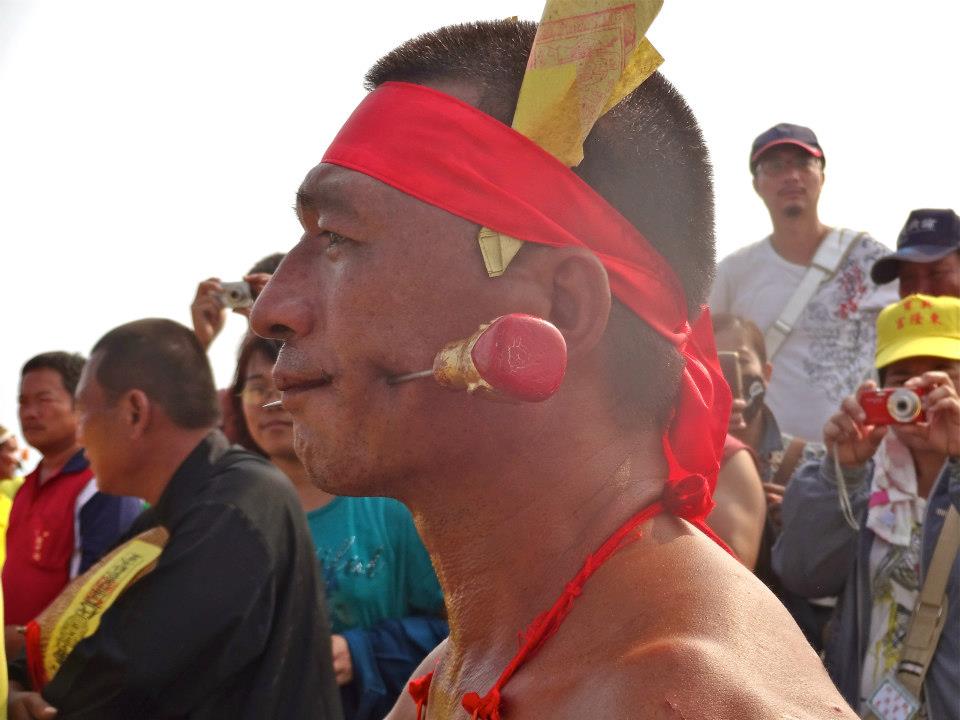
Wishing on the King Boat
The King Boat, bedecked with lanterns, ornately painted in traditional Chinese patterns of dragons and clouds, sat surrounded by a wall of wishes. For a small fee, you could buy a wooden plaque about the size of a smartphone onto which you could write your name, address, and wish. Most concerned personal fortune, ranging from wishes for larger families, work promotions and romantic partners. Predictable, but moving nonetheless; humanity’s common struggle on little pieces of wood, destined to reach the sky in a cloud of smoke a week later, when the King Boat would be loaded with ghost money, wishing plaques and other offerings to be burned on the beach in a spectacular dawn bonfire that would burn for up to three days.
Having been summoned back to earth by the opening ceremony, The Thousand Year Grandfather would be sent back out to sea laden with gifts and money, presumably to take all of Donggang’s illness and bad luck with him.
But before this could occur, he would need to be called in by a myriad of other gods, themselves channeled by the spirit mediums already gathering around town.
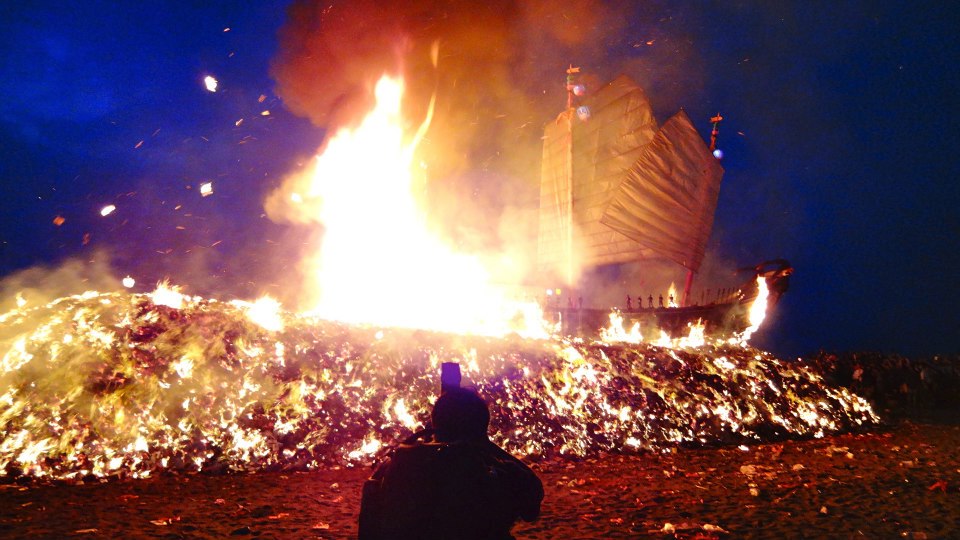
(Read more about the burning of the King Boat at Holy Conflagrations: Boat Burnings at Taiwan’s King Boat Festival.)
How the gods are summoned
By dawn the next morning the beach had become an encampment. Entire temple delegations parked themselves on small dunes, sticking incense into the sand, smoke mingling with the morning haze. Troupes representing the Eight Generals began to appear, men and boys in elaborate face paint who act as the protectors of gods and people, doing martial demonstrations while neither smiling nor speaking throughout the ritual.
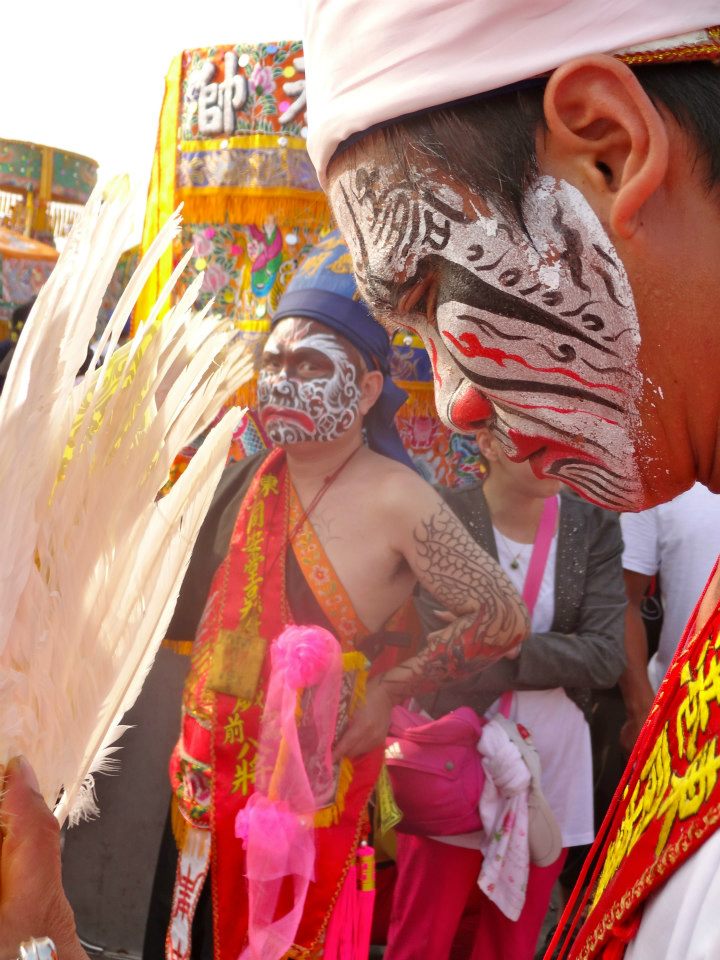
We wandered a bit, resting in the wet sand. We drank down our water supply. I shot photos. When I asked those nearby when it was all going to begin, they inevitably replied,
“Soon. It will happen soon.”
As the hours passed, we grew impatient and continued asking fellow participants.
“Three, maybe,” answered one.
“Right after lunch,” said another.
“Maybe after four?” said yet another.
Finally, someone in the crowd looked over at me and said simply,
“It starts when the gods say it starts!”
The Festival Begins
Moments later, we heard drums joining the previously disjointed cacophony in a steady, entrancing rhythm. The man next to me began shaking. His hand rose and fell. It looked like he was doing musical kung fu, conducting a martial arts orchestra. He lifted his head toward the glowing sun. His lips shook and his knees wobbled, but he did not fall.
I heard a moan, quite distinct from the bubbling of the waves at my back. It wasn’t coming from the shaking man, though. It was coming from the water. A woman I’d seen walking around before was now standing knee deep in the sea. Someone had tied a red sash around her waist, and she was moving her arms in circles as she cried. The trembling man had a red sash now, as well. His movements grew more elaborate and holding a bundle of burning incense. He gave a long, deliberate moan, and slowly put the incense, burning end first, into his mouth. (Read also: Eight Taiwan Lantern Festivals (that aren’t the one you think)
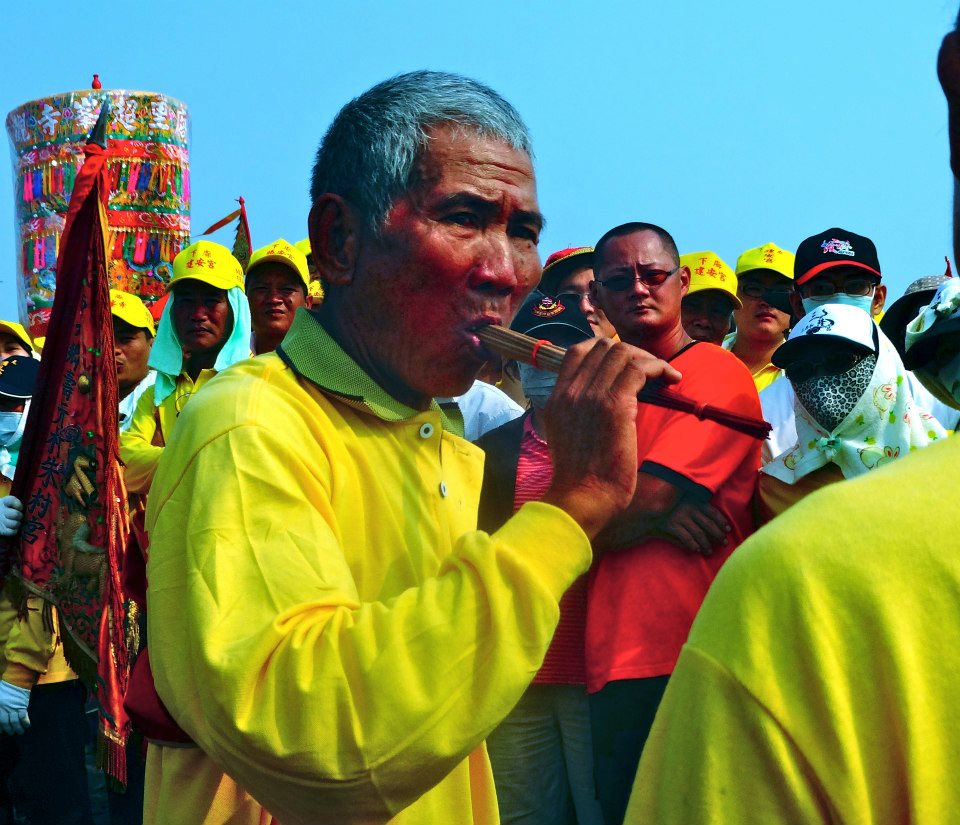
An old man I recognized from our previous visit ran up to my left. He was compact and gray-haired, with teddy bear features. He dangled a spiked ball from a cord and shouted at the sea, talking to the waves. Two men, one older, with gray hair and heavy-lidded eyes and one younger, with smooth, tan skin and a buzz cut, stood near each other. They were gazing serenely across the mayhem erupting down the shoreline. Both had long needles the thickness of drinking straws in their cheeks. One turned; he also had flags of the kind often found on the back of Chinese folk gods piercing his back on bamboo spikes, his skin folded to hold them in place.
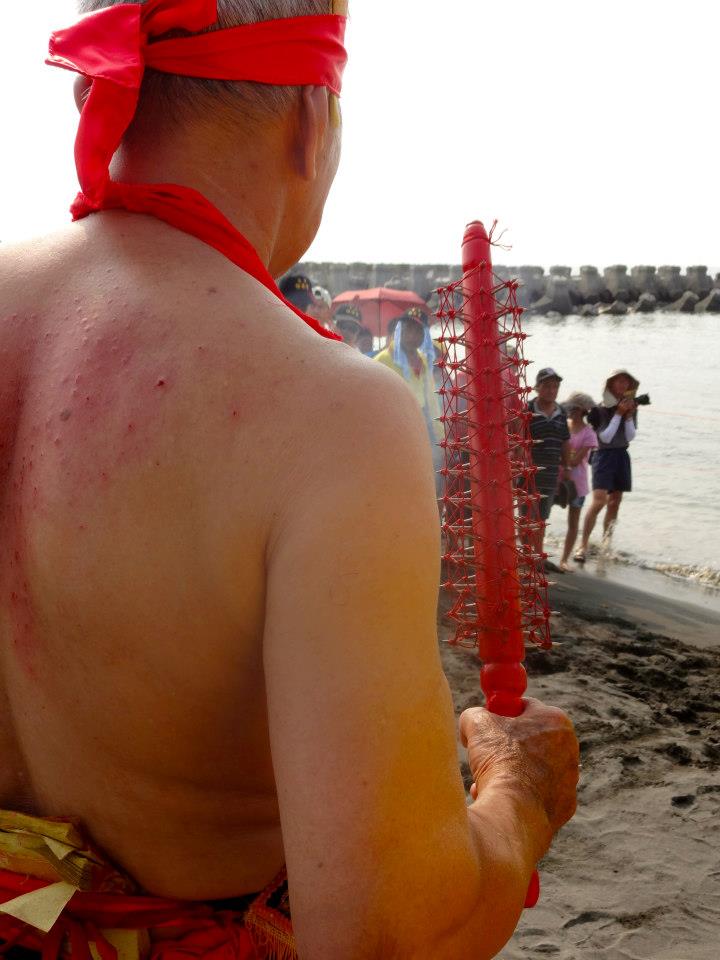
A man near them was beating his back bloody with a spiked club wound with red thread. A woman in a long white robe was grunting and doing Tai Chi moves with her hands. One man holding an aluminum sword cut his shoulder blade in a single, fluid motion. Another, holding an idol, got a wild look in his eyes and began to dance slowly, one leg in the air, knees bent, hopping and twisting. The two men danced, hoisting the idol in the air as if it weighed nothing.
A woman threw a red spiked ball wound with red cord and caked with blood into the air and caught it on her back. She was wearing an embroidered yellow smock and blowing raspberries in a distinct rhythm. Another had a similar spiked ball stuck into the skin on the crown of his head, tied in place with one of the ubiquitous red sashes.
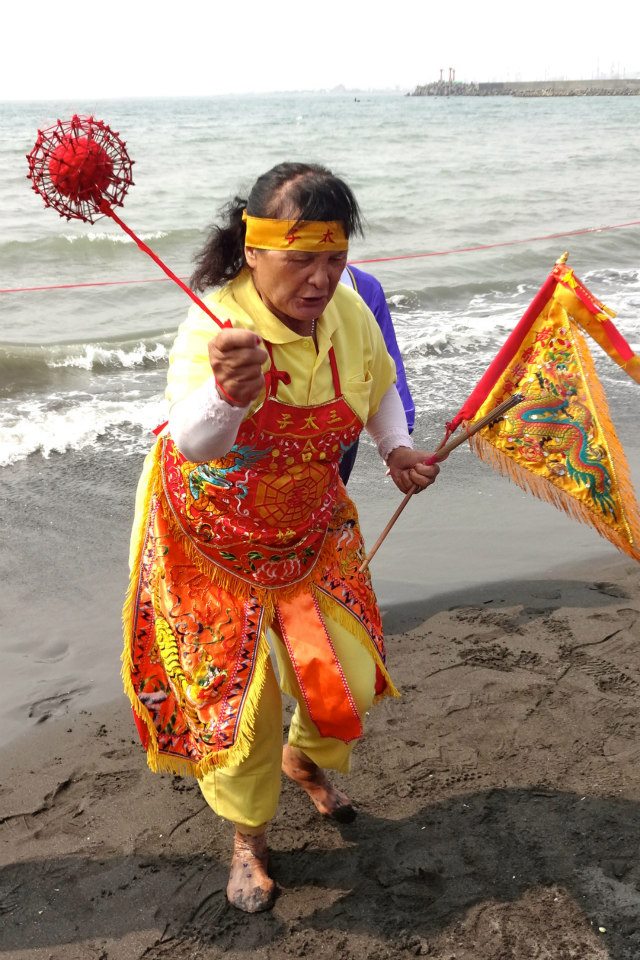
In the surf sat a man in a yellow silk robe covered and a peaked yellow hat embroidered with the sign of the Buddha. He drank deeply from a medicine gourd-shaped bottle, every so often laughing and spraying liquor into the air. I realized that he must be possessed by the spirit of Ji Gong, an eccentric, tenth-century Chinese monk known for drinking and wandering.
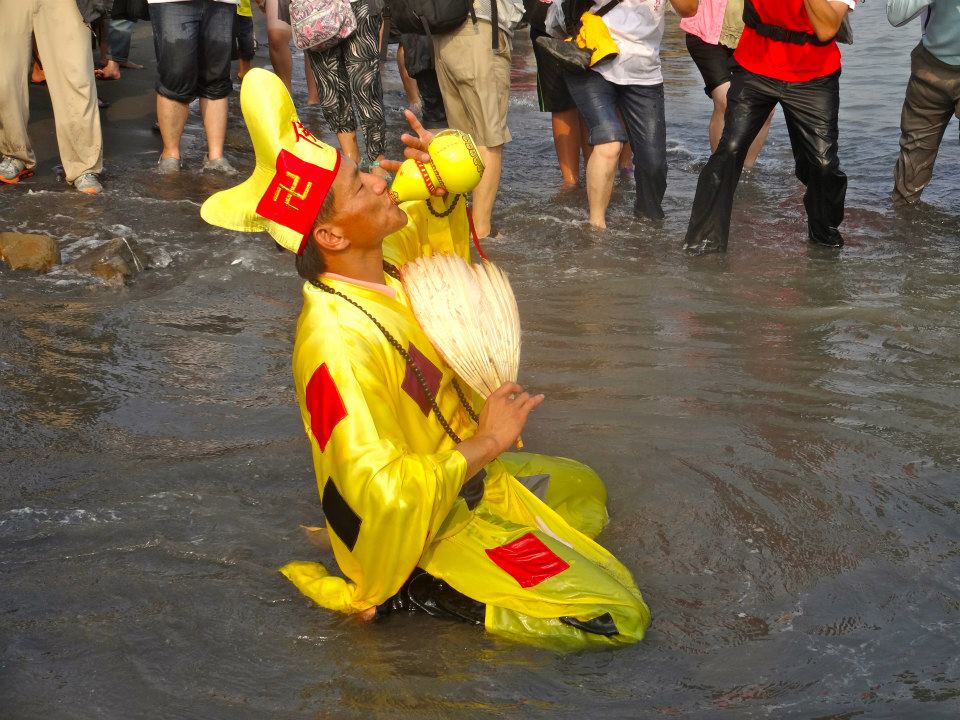
Laughing, dancing, moaning and self-flagellating, these were Jitong (Dang-ki in the Taiwanese language), believers who allowed their bodies to be possessed by the spirits of gods, immortals, and other celestials. The beach was overrun with such Dang-ki, each wearing a bright red sash, most with one or more attendants handing them tools, spraying antiseptic and pressing paper talismans into their wounds, keeping them from drowning in the ocean, and keeping onlookers like me from getting too close.
The drums grew louder, the waves larger. Firecrackers erupted into tufts of smoke, clouds of incense wafted out to sea. The unrelenting sun beat down, waves of heat following the rhythm of the drums. I don’t know when I stopped taking photos. I was barely aware of my camera in my hands, and yet it remained dry. It was hot and bright. I was thirsty, having long since run out of water. I was engulfed by heat, smoke, and noise.
The woman I saw in the water earlier had been joined by two others, wearing similarly embroidered yellow smocks. They stood waist-deep in the sea, interacting only with each other as though nobody else on the beach existed. They began moaning in crescendo, following the steady swell of the waves. They came more roughly now; the tide was coming in. I could hear the women but the sun was so bright that it was difficult to see. My back was to the ocean.
At their third cry, there was a massive gust of wind. A large wave pummeled my back, and I was forced closer to shore. The drums grew louder.
Suddenly, everything went white.
The Narrator is Possessed?
What felt like seconds later, I was standing in the wet sand several meters away, holding my forehead and surveying the crowd. A chair appeared under me. I sat for a few moments. A bottle of water was handed to me and I took a swig. A few people around me were very solicitous – I noticed one was holding one of those spray bottles of antiseptic used on the Dang-ki. Had I acquired a few Dang-ki attendants of my own?
It didn’t matter that I didn’t believe in spirit mediums and possession. It didn’t matter that I was a woman, or even that I was a foreigner. Those around me interpreted what they saw as a possession. As a committed atheist, I chose to view it as earthly entrancement; after all, what could be more earthly than having your head scrambled by heat, sun, sand, and smoke?
It hardly mattered what I thought. There was room on the beach for both interpretations. After a few minutes, the attendants dispersed. I wandered off to take more photos.
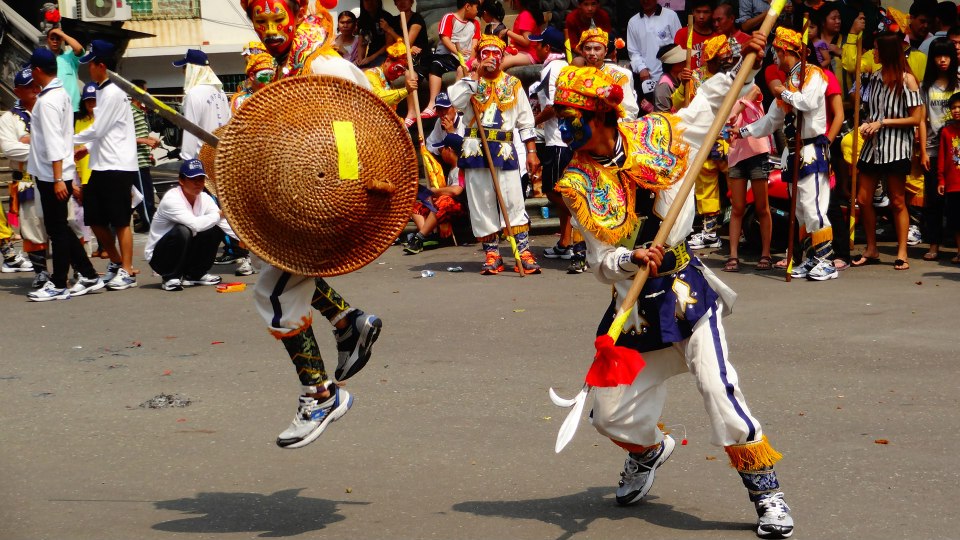
On a quiet corner of the beach, a man and a woman were dancing, both possessed, both wearing red sashes and holding fistfuls of incense, moving their arms in a coordinated motion. Both had scars, now clotting, running down their backs. As the man held his incense out over the woman’s head, she pulled her own bundle back. Then he retracted his arm and she stretched hers forward over his head.
A swath of fireworks exploded simultaneously. The drums began banging together, joined by gongs and cymbals. A thousand balloons were suddenly released from a spot on the southern end of the beach as people clapped. The drumming stopped. Those still possessed began to come out of their trances, all at once, and reverted to being human. Red sashes were shed.
The Thousand Year Grandfather had arrived!
~~~
Text and photos by Jenna Lynn Cody. Gods Rush In at the King Boat Festival excerpted with author’s permission from Gods Rushing In, published in How Does One Dress to Buy Dragonfruit?: True Stories of Expat Women in Asia, Signal 8 Press, 2014.
Check out The Mazu Pilgrimage Experience for more Taiwanese festival content!

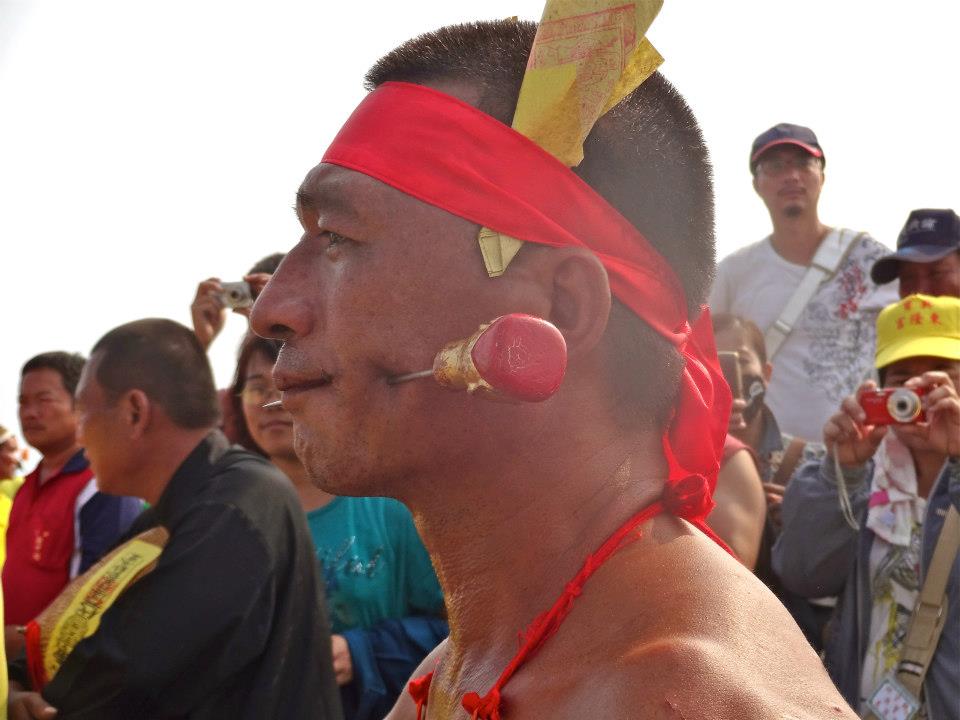










Comments are closed.